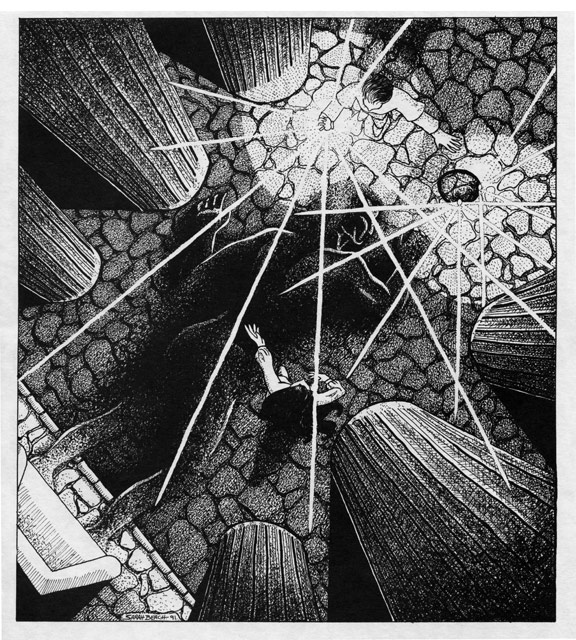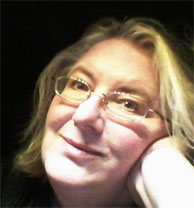(Originally posted on LiveJournal)
As I’ve been re-reading what is written of The Ring of Adonel, and working on the rewrites/polishes, I’ve also been thinking about some of the choices I made in the story. Particularly the scope of it.
It seems there is a powerful impulse in fantasy writers to make the major conflict in their stories the most important clash of good versus evil that their world has ever seen. The Ultimate Confrontation with Evil. A total Save The World story, with the whole of the world as the stakes.
Now, it’s not that this is necessarily a bad thing. There have been some good stories from such confrontations.
But….
What happens when the author finds that he or she wants to go back to that fantasy world? The heroes in the first story have already take out the Major Evil. So, isn’t any evil figure that follows going to be a lesser one?

Beren & Luthien take a Silmaril from Morgoth’s Iron Crown
Tolkien got around this by having his Uber Bad Guys, Morgoth and Sauron, be (in effect) fallen angels, immortal and not such as could be completely destroyed by those born in Middle-earth. But not everyone goes to such lengths, and they have their heroes manage to destroy the Looming Evil.
And there’s a really big problem when the apocalyptic fantasy involves prophecies as well. If all the prophecies are fulfilled in the original story, what the heck is going on when the author returns to visit the world? What does happen next? And why didn’t anyone know that there might be something beyond the apocalyptic confrontation? Wheren’t there any prophecies that apply to this new conflict, and why didn’t anyone mention them the first time around?
So, some of these questions were part of what led me to shape my story as I did. Sure, my hero is indeed in a bit of a conflict with my Uber Bad Guy. But this conflict does not involve the idea that my hero would ever be able to destroy or even severely diminish the Uber Bad Guy. And, actually, the main myth that underpins the whole of The Ring of Adonel will, in the end, explain why the Attondar (the major resident angelic Powers) do not engage in direct conflict with Caimcadar (the Uber Bad Guy).
But I still think about the problems that apocalyptic plotting can create for a writer. And basically, I didn’t want to irritate my reading audience by having heroes win a complete victory over an Uber Bad Guy… and then come back with a sequel where I was asking them to believe that “Ooops, the victory wasn’t quite as complete as they thought.”
Comments
jpantalleresco – May. 6th, 2008
Usually when you look at apocalyptic writing, it’s about the end. If you ever want to do a sequel, you try and build a new beginning. JMS did something along these lines with Babylon 5. He started with the great apocalyptic threat of the Shadows and built that as a major part of his arc for the first four seasons. After they left, he proceeded to create a new beginning: The Interstellar Alliance.
With Fantasy the concept really isn’t that dissimilar. Apocalypses destroy the world as you know it. If you’re a fantasy writer wanting to return to that world, you take the next step.
What happens after the end? The Beginning. David Eddings did something like that with the Mallorean. I’m not suggesting that’s the only way to go mind you, but really, after the apocalypse, what else would survivors do?
Just my two sense.
JP
scribblerworks – May. 8th, 2008
Well, actually, Eddings was on my mind when I was commenting on the matter of prophecies. Did none of those making prophecies see beyond the big apocalypse of the first series? That didn’t seem realistic to me.
But I have other problems with Eddings’ work — such as the fact that the victory in the Belgariad didn’t cost the heroes anything. At all. That is so wrong to my way of thinking.
As for Babylon 5… well, JMS didn’t see the conflict completely as an “end of the world” type conflict, and the opponents, though very very powerful, were not actually perceived as gods. Plus, all the “prophecies” were composed within the circle of a time-travel loop (ie, Sinclair went back in time and could leave hints – prophecies – because he knew as fact what would be faced). And other visions could be interpreted multiple ways, instead of being about completely explicit events.
Anyway… something to muse about: the impulse to write for the Big Earthshaking Event – without considering that the Earth has to continue on after that.
(These are somewhat rambling thoughts, admittedly.)


